Phyllis Edgerly Ring's Blog, page 26
June 21, 2015
Wringing out the light
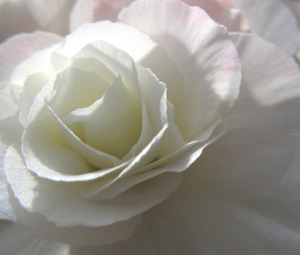
Photo: https://www.etsy.com/shop/DKirkupDesigns
Such love does the sky now pour, that whenever I stand in a field, I have to wring out the light when I get home.
~ St. Francis of Assisi
… Obstruct not the luminous spring of thy soul with the thorns and brambles of vain and inordinate affections, and impede not the flow of the living waters that stream from the fountain of thine heart.
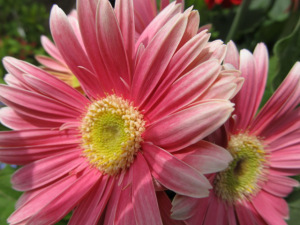
Photo: Photo: https://www.etsy.com/shop/DKirkupDesigns
~ Bahá’u’lláh
It is not a question of whether you “have what it takes,” but of whether you take what you have—and then use it. Take the gifts you have—they are plenteous—and share them with all the world. Apply them to the challenge at hand. Use them and give them in your life as if there’s no tomorrow. Cultivate the desire to do this. If you have the desire, you will have what it takes—precisely because desire is what it takes.”
~ Neale Donald Walsch

Join Night Owl Reviews’ Find Your Next Great Read Scavenger Hunt in June to discover great new books and authors, and maybe win an Amazon Gift Card: https://www.nightowlreviews.com/v5/Blog/Articles/Find-Your-Next-Great-Read-Scavenger-Hunt-June-2015


June 19, 2015
Author of wild, unpredictable circumstance: my dad
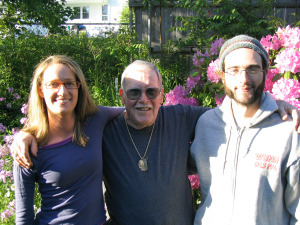 Eight years after my father’s death, a memory of him blooms as faithfully each June as the flowers erupting all around.
Eight years after my father’s death, a memory of him blooms as faithfully each June as the flowers erupting all around.
Days after his death, I was lamenting the achingly empty rooms of his house when something pulled my attention to his back garden.
The brilliance waiting there nearly bowled me over — I remember literally gasping to get my breath back. Every bush, shrub, and bulb he’d ever planted seemed to be in bloom at once, ecstatic testimony to the indomitable nature of life itself.
That indefatigable blooming brought to mind the last bit of gardening we’d done together the year before. Dad had a little strip of land on which he planted impatiens each year. That June, I’d spied two trays of them on his patio and realized that, since he could barely walk any longer, there was no way he could plant them. 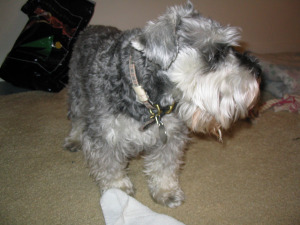
We were quite a team that day, “helped” by his ever-eager miniature schnauzer, Patsy, namesake of the saint on whose day she was born. Dad churned up the soil with a long-handled trowel while I followed, nestling the little plants into place. It had just rained so the job was messy, the mosquitoes thick, and Patsy a determined quality-control inspector (i.e. right in my face) as I hunkered over those beds.
I knew the task was one of the very last things we’d do together.
Year by year, I discover the many intangibles my father helped bring to bloom. The day of my UMass graduation, he pulled the car to the side of the road on a rise that overlooks Amherst (he was inclined to try and execute things with a flourish), turned around to where I sat in back, and announced: “You graduated. And you did well. But most important is that you kept going. You didn’t give up. In time, you’ll value that more than anything else.” 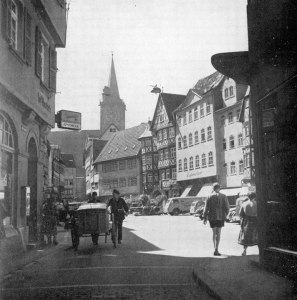
This June’s new bloom is the next book that will take wing soon, the one on which I’ve been working since right after I met his eyes and watched him take his last breath that June day in 2007. As steeped as The Munich Girl is in Germany and World War II, he unquestionably had something to do with the wild combination of unpredictable circumstances that steered me headlong into it. (Wild combinations of unpredictable circumstances were one of his hallmarks, too.)
And yes, yet again, he was absolutely right about the value of perseverance, whose importance always becomes more visible in the light of time.
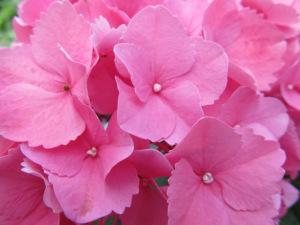 Thinking about plants and growth, I’m reminded of an instance in which ‘Abdu’l-Bahá counseled someone who’d experienced the loss of a loved one that while the pain of physical separation remains for those left behind, for the one who dies, it’s as though a wise and kind gardener has transplanted a struggling plant to a wider, more welcoming place where it can reach a whole new level of growth.
Thinking about plants and growth, I’m reminded of an instance in which ‘Abdu’l-Bahá counseled someone who’d experienced the loss of a loved one that while the pain of physical separation remains for those left behind, for the one who dies, it’s as though a wise and kind gardener has transplanted a struggling plant to a wider, more welcoming place where it can reach a whole new level of growth.
Many things in life, as well as death, bring that home to us each day.

Join Night Owl Reviews’ Find Your Next Great Read Scavenger Hunt in June to discover great new books and authors, and maybe win an Amazon Gift Card: https://www.nightowlreviews.com/v5/Blog/Articles/Find-Your-Next-Great-Read-Scavenger-Hunt-June-2015
Bloom on, Dad. And thanks for that reminder, much more useful than my degree ever was.
 From Life at First Sight: Finding the Divine in the Details.
From Life at First Sight: Finding the Divine in the Details.
More about the book at:


June 16, 2015
Wonder wakes the hidden mystery

“Colorado Moonlight” by Judy Wright
Nature is the kind surface, the intimate face of a great unknown.
It is uncanny to behold how boldly we walk upon the earth as if we are its owners. We strut along, deaf to the silence in the vast night of the unknown that lives below the ground.
Above the slim band of air which forms the sky around our planet is the other endless night.
Wonder makes the unknown interesting, attractive, and miraculous.
A sense of wonder helps awaken the hidden affinity and kinship which the unknown has with us.
~ John O’Donohue, Eternal Echoes
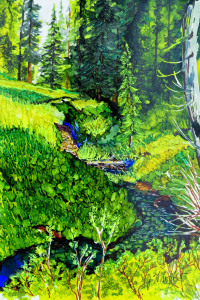
“Rivulet” by Judy Wright
If the people of the world were wise enough
to plant the root of their lives
deep within the Subtle Origin
Then the worldly affairs of life
would coherently follow their natural course
and harmony would abound of its own nature …
Then the peaceful order of the universe prevails
and unity manifests again of its own accord.

Join Night Owl Reviews’ Find Your Next Great Read Scavenger Hunt in June to discover great new books and authors, and maybe win an Amazon Gift Card: https://www.nightowlreviews.com/v5/Blog/Articles/Find-Your-Next-Great-Read-Scavenger-Hunt-June-2015
~ Lao Tsu, Tao Te Ching


June 13, 2015
Restoring breadth and depth

Photo: David Campbell
I’m at that (re)writing and editing stage where everything is closing toward the end in a work I’ve lived with — that has lived with me — for lots of years. The simultaneous presence of joy and fear can be nearly overwhelming, some days.
This has reconnected me with the power of my relationship with my thoughts — the very narration of my days. And revisiting an insightful article by writer Steve Almond reminds me of what’s missing in much of writing these days: an effective narrator. It strikes me that I need one personally, just as much as my writing does.
In the cultural shifts of the last decades that turned many into viewers rather than readers, “we’ve lost our grip on the essential virtues embodied by a narrator: the capacity to make sense of the world, both around and inside us”, Almond writes. Narrators serve the role of portraying big things, conceptually: how individual fates collide with history. More than just awakening readers’ sympathies, they help enlarge their moral imagination as “they offer a sweeping depiction of the world that helps us clarify our role in it”, he says. The perspective that narration offers helps us make meaning of a story, and of our lives, and also find a sense of place for ourselves in the scheme of things.

Join Night Owl Reviews’ Find Your Next Great Read Scavenger Hunt in June to discover great new books and authors, and maybe win an Amazon Gift Card: https://www.nightowlreviews.com/v5/Blog/Articles/Find-Your-Next-Great-Read-Scavenger-Hunt-June-2015
In times whose only constant seems to be constant change, we need narrative more than ever, even as it’s fast disappearing. While publishing gets downright pedantic that writers “show, don’t tell”, a well-developed narrative and its vital contribution to a story, like nutrition in a diet, becomes endangered through ignorance and oversight.
Narrative is as essential in human life as purpose is. It’s the one thing that, when time is shrinking, spinning, rushing past us with ever-increasing speed, points faithfully to what is timeless. We don’t need it to spoon-feed us, naturally. But we do need its signposts.
Almond notes that media has created increasingly passive audiences, able to absorb and react, but not to imagine. That’s a pretty low (survival-based) level of human experience. And, accordingly, the focus of a lot of current writing is on the instinctual aspects of human beings — survival or perpetuation of the species (chase scenes and preoccupation with the sexual, often voyeuristically so).
Author Nathan Rutstein predicted this more than 25 years ago. He had worked in television and other media and authored many books when he made the observation that human society was increasingly losing sight (literally, as if not seeing it) of the higher possibilities and qualities in human potential as it grew more fascinated with and gripped by materialism, both in media and in the rest of what was called culture.
 Almond’s article describes the approach of most media as that of “minimizing sustained attention”, which results in a flitting, easily distracted behavior that doesn’t ever engage with any depth – becomes incapable of doing so, perhaps. That’s almost the exact opposite of what a novel (or painting or play) was designed to require and invite. Or a spiritual, contemplated life.
Almond’s article describes the approach of most media as that of “minimizing sustained attention”, which results in a flitting, easily distracted behavior that doesn’t ever engage with any depth – becomes incapable of doing so, perhaps. That’s almost the exact opposite of what a novel (or painting or play) was designed to require and invite. Or a spiritual, contemplated life.
Reading, unlike scanning and surfing, requires involvement and commitment, both from writer and reader. The narrator, and a story’s narration, is what facilitates this, helps create a book’s world, then lends it meaning. Many books now feel as much like packaged entertainment as most commercial television, and as unsatisfying and lacking in nourishment for our inner life. Much in publishing seems to train attention on mechanics, a shock-value, attention-getting and contrived writing style and manipulative repetition of “tropes”. A cookie-cutter approach to more of the same. So much more of the same. Preoccupation with the lower nature, particularly if a series might be wrested from it. In order to have more of the same. Where is the room for discovery, depth, mystery? Soul?
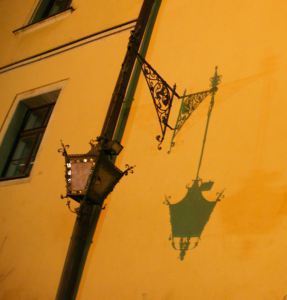
Photo: David Campbell
Almond describes how although some current works reach for these, “still work heroically to make sense of the world”, they find themselves “on the margins of a popular culture dominated by glittering fantasies of violence and fame. On a grand scale, we’ve traded perspective for immediacy, depth for speed, emotion for sensation, the panoramic vision of a narrator for a series of bright beckoning keyholes,” he says.
We’ve bartered away the riches of our indwelling higher nature, what brings meaning and depth to life, for the indulgence and absorption of our instinctual one. In a way, that is the only aspect of human being that seems to get the attention and focus now, perhaps with a thin veneer of the intellectual applied over it, or emotion that’s dealt with mainly in sentimentality, hyper-dramatization or other superficiality.
Narrative, and the meaning it serves, can restore the breadth and depth of human experience and bring it back home whole. Ennobled. True expression, in any form, and always, in its highest one, is incomplete without it.
Find Steve Almond’s excellent article at: http://www.nytimes.com/2013/01/13/magazine/once-upon-a-time-there-was-a-person-who-said-once-upon-a-time.html?pagewanted=all&_r=0


June 10, 2015
The ties that truly bind
A long-anticipated visit with my sister this month can’t help but bring me close to family history, as so many scenes in my novel do these days, too.
Born ten years apart, we were both “only children”, aside from the six years we actually spent together in our parents’ home. My arrival doomed her to a role of perpetual baby-sitter. In my little psyche, she was also a surrogate parent, an adult-like being – unfailingly elegant and unbelievably smart – who actually saw me, when the atmosphere in which we lived could make a lot of things seem invisible. More, she remembered me, and continued to accompany me, long after the early get-away she made when she was barely 18.
Though we’ve really gotten to know each other as “grown ups”, I feel as though I felt her company all of my life – before, during, and after my arrival here.
She has written of her own experience: “I felt almost apologetic for my own childhood, which I viewed (correctly) as an enormous household inconvenience, something to be conquered quickly and forgotten, like chicken pox or diarrhea.”

Our first stop in 1960 as Army Brats in Germany.
But with the arrival of a younger sister, she notes, “I seized the opportunity to Be Older, taking charge of her needs, protecting her from my own tadpole experience. … I heard my orders from a Higher Power, beyond parents, to guide this little person safely past the treacherous shoals of childhood.”
“I decided that you’d probably grow up to be a tactful, diplomatic person,” our British mother once described of her when, on her very first airplane flight (from London to Bordeaux, France), my four-year-old sister made polite conversation with two travelers seated across from her and my mother. My mother describes them as “dressed in the full regalia of those who live in Arab countries”.
When my sister turned five, two military police arrived each weekday shortly before dawn to escort her to school via military staff car, a ride of an hour each way. It’s no wonder I’ve always perceived her as leagues ahead of me in worldly wisdom and experience, rather in the style of Jane Goodall or Agatha Christie. 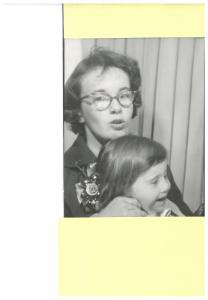
By the time I was four, she’d already won first prize in a national U.S. magazine’s annual writing contest. She was 14. Her teen-age years are the ones my child self remembers best, some of the sweetest in my memory, set in a fairy-tale German town, no doubt so sweet because she was there.
She’s given me more gifts than I can count, but one of the most meaningful came recently with her instant inner understanding of The Munich Girl, the novel I’ve been working on since our father died in 2007. Hearing her intuitively wise thoughts about the deepest intent of this book and its story was vindication that my soul, however much it aspires to write, hardly knows how to put into words.
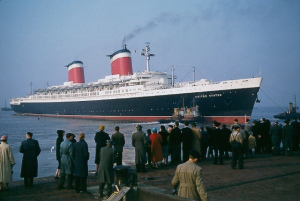
The ship that carried her away from Bremerhaven in 1962.
In my writing hours, when I want to evoke heartbreak, I think of how I felt on the day after she left Germany for America — or the day after she got married – when realization caught up with me that she wasn’t ever coming back to sleep in the room we had always shared.
I suppose it was inevitable that the book on which I’ve spent so much time, and love, would become a story of separations and reunions.
She tells a story of how, before she boarded the ship that took her away from Germany, I pressed a note into her hand with the instructions that she not open it until she was “home”.
Once in America, this 17-year-old military brat who had skipped not one, but two grades on her path to a scholarship at Boston University “suddenly felt as alone as I have ever been”. 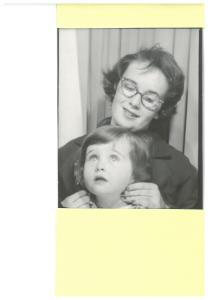
Then she remembered the note. At six, I was a writer of few words, none of them very neat, though pithier than I tend to be now. The note read: “Rite Sune”.
And, she says, she was home.
As I am, wherever she is in the world, whether I’m with her or not.
This, I’ve decided, is what “family” truly means. As a character in my novel observes: “So often, the ties that truly bind us the most have nothing to do with being related.”
But when they do, it is light upon light.

Join Night Owl Reviews’ Find Your Next Great Read Scavenger Hunt n June to discover great new books and authors, and maybe win an Amazon Gift Card: https://www.nightowlreviews.com/v5/Blog/Articles/Find-Your-Next-Great-Read-Scavenger-Hunt-June-2015


June 7, 2015
Writing = Rewriting
Writer VL Towler recently shared a post at her blog that both humbles and instructs the writer I try to be in the world.
Her own dedication to her work inspires me very much, and her observations here summarize a great deal about the reality that all writing is rewriting.
Ms. Towler’s novel, Severed, is scheduled for release this year.
Five Lessons My Editor Taught Me About Writing (and Why My Life Is Not Wasted Waiting So Long to Learn Them)
by VL Towler

Join Night Owl Reviews’ Find Your Next Great Read Scavenger Hunt in June to discover great new books and authors, and maybe win an Amazon Gift Card: https://www.nightowlreviews.com/v5/Blog/Articles/Find-Your-Next-Great-Read-Scavenger-Hunt-June-2015
 I set out to write my soon-to-be published novel over 13 years ago when I moved to New England after my mother’s second husband passed away. With no income to speak of, and no friends, I aimed to write a novel after my foray into screen and television writing in California (where I grew up) foundered. Don’t get me wrong. I’ve had a great career in movies, television, and even an off Broadway play–just none of it is attributed to me, although my fingerprints are everywhere, even on television series that you are watching today.
I set out to write my soon-to-be published novel over 13 years ago when I moved to New England after my mother’s second husband passed away. With no income to speak of, and no friends, I aimed to write a novel after my foray into screen and television writing in California (where I grew up) foundered. Don’t get me wrong. I’ve had a great career in movies, television, and even an off Broadway play–just none of it is attributed to me, although my fingerprints are everywhere, even on television series that you are watching today.
But the Play button must be pushed. Life goes on.
Read the post at: http://vltowler.blogspot.com/2015/05/five-lessons-my-editor-taught-me-about.html


June 5, 2015
Summertime, and the reading is — a scavenger hunt

Join Night Owl Reviews’ Find Your Next Great Read Scavenger Hunt in June to discover great new books and authors, and maybe win an Amazon Gift Card: https://www.nightowlreviews.com/v5/Blog/Articles/Find-Your-Next-Great-Read-Scavenger-Hunt-June-2015
Coming Soon –
Summer reading fun at Night Owl Reviews.
Join the Find Your Next Great Read Scavenger Hunt in June to discover great new books and authors — and maybe win an Amazon Gift Card.
100 Amazon Gift Cards are up for grabs, and the grand prize is a $250 Amazon Gift Card.
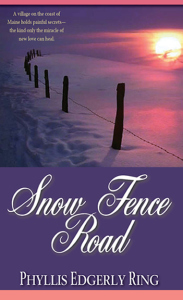 Snow Fence Road is part of the fun as a June sponsor.
Snow Fence Road is part of the fun as a June sponsor.
Learn more and enter here:
https://www.nightowlreviews.com/v5/Blog/Articles/Find-Your-Next-Great-Read-Scavenger-Hunt-June-2015
Happy hunting!


June 3, 2015
The brave journey of becoming
Gleanings about art and life, found here and there:
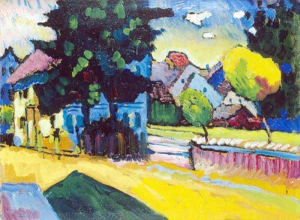 A book, once it is printed and published, becomes individual. It is by its publication as decisively severed from its author as in parturition a child is cut off from its parent. The book ‘means’ thereafter, perforce — both grammatically and actually — whatever meaning this or that reader gets out of it.
A book, once it is printed and published, becomes individual. It is by its publication as decisively severed from its author as in parturition a child is cut off from its parent. The book ‘means’ thereafter, perforce — both grammatically and actually — whatever meaning this or that reader gets out of it.
~ James Branch Cabell
Make beauty and vulnerability your allies in your brave journey of becoming.
Though I cannot predict what I shall be able to do, I hope to make a few sketches with perhaps something human in them …
~ The Letters of Vincent van Gogh – 4 September 1880
… art is a power that should be aimed at developing the soul. If art does not do this job, the abyss that separates us from God is left without a bridge. …
The artist must be blind to distinctions between ‘recognized’ and ‘unrecognized’ conventions of form, deaf to the transitory teaching and demands of his particular age. He must watch only the trend of the inner need, and hearken to its words alone. ~ Wassily Kandinsky
Artwork by Wassily Kandinsky


May 31, 2015
At the shores of discovery
You will write if you will write without thinking of the result in terms of a result,
but think of the writing in terms of discovery.
~ Gertrude Stein
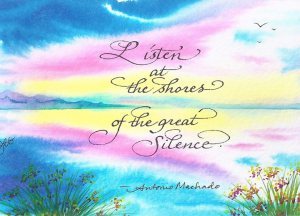
Image: http://nothingshortofjoy.com
I’m always searching for descriptions of what writing process feels like at its most essential level, and haven’t found any that describe it better than Gertrude Stein does here.
She’s gone straight to the heart of what allows writing process to be a revelatory power, and a bestower, rather than a distraction or plaything. The difference between these is a willing surrender into seeking and unknowing, rather than a presumed knowledge of any kind. The fact that what she observes about the experience of writing also applies to that of living makes her simple truth seem even more sublime.
As she suggests, my experience of writing is of something to be approached on the only terms it truly allows – the terms of discovery. I know that I’m immersed back in that process when things begin to strike with notes my inner ear can hear, when my crown and scalp suddenly tingle.

Image: Cary Enoch / https://plus.google.com/+CaryEnochReinsteinenochsvision/posts
Before I reach that however, there’s the unavoidable surrender to that great blank that seems that it will never yield, no matter how I push on or try to break through it. And that is because I’m the one who’s meant to do the yielding.
Recognizing this — rather early, thankfully — is probably the reason I’ve continued writing at all. It was reinforced for me one afternoon while I swam with a friend, and remembered that in order to even be able to do this, I must meet the water where it is. I don’t take hold of it or try to manage it, but rather yield to and work with the way it envelops and supports me.
Every aspect of the story in my novel, The Munich Girl, every theme, revelation, and scene, has come to meet me in a similar way when I was ready to receive it, after I had immersed myself in its atmosphere and waited, listening, watching. Trusting. 
Believing that I “know” anything about a story before it has fully shown itself is the only “writer’s block” I’ve ever placed in my own way. “Save it for the page,” one character tells another about the experience of writing. “You know that it will lose its edge — its charge — if you don’t.” Save yourself, your willingness to not know, for what the page — or the day — will reveal, is how I might express that today.
Every story I’ve carried through to completion began with seeing or hearing something in the daily noise of life that stayed with me and took root inside, or was like a silent presence that followed me home. Just as with an animal for whom we would offer a home, it requires that a relationship of mutual trust be built.
Part of that trust for the soul who surrenders to creative process is that we will be met by what we are able to receive, and to integrate, on the deepest levels. A swimmer flailing in fear will not find herself very well supported by the water, even though its quality of buoyancy is always there. We learn to swim by learning to respect the qualities of the water, and shape our own ability to working with it. In a way, we become one with it. Creative process, when met with regard and respect, brings a very similar kind of connection with our own wholeness, and that of the whole world.


May 28, 2015
Quenching our deepest thirst

Photo: Nelson Ashberger
Imagine we are desert-bound souls desperately seeking water. If we are offered anything but water we will turn away. We might be offered a change of clothes, food, shelter — all good things. But the desperate nature of life-threatening thirst will cause the thirsty one to reject what is offered as if the offering were poison.

Photo: David Campbell / http://gbctours.com
When we experience intense suffering, our world seems to narrow dramatically and become very small. Imagine the intense pain we feel when we sustain a deep burn–or a deep loss.
Do we really care, at that moment, about any other needs in our life, no matter how legitimate they are? The need that seems most desperate can crowd out of our consciousness all other needs until that need is met, whether it is removing our hand from a heat source, healing from grief, or quenching our thirst with life-giving water. 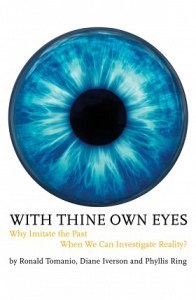
If it is our desperate need to discover our authentic self and purpose, then once we become aware of that true identity and purpose, we’ll understand the most beneficial choices for us to make. As with any thirst, it is a matter of first things first. The tricky challenge is that often, rather like seeking water in sand, our mind seeks purpose and fulfillment in the material realm that, much like sand, offers neither resources to meet our deepest need, nor a viable foundation upon which to build.
Without the awareness and involvement of our spiritual nature — who we truly are — our life is rather like a gift we can never unwrap nor fully receive.
Excerpted from With Thine Own Eyes: Why Imitate the Past When We Can Investigate Reality?
More information: http://www.amazon.com/With-Thine-Own-Eyes-Investigate-ebook/dp/B00I1JPC7I/ref=pd_sim_kstore_11?ie=UTF8&refRID=0TQC490J7FVBRTJWM70H
Print version at: http://www.bahairesources.com/with-thine-own-eyes.html







